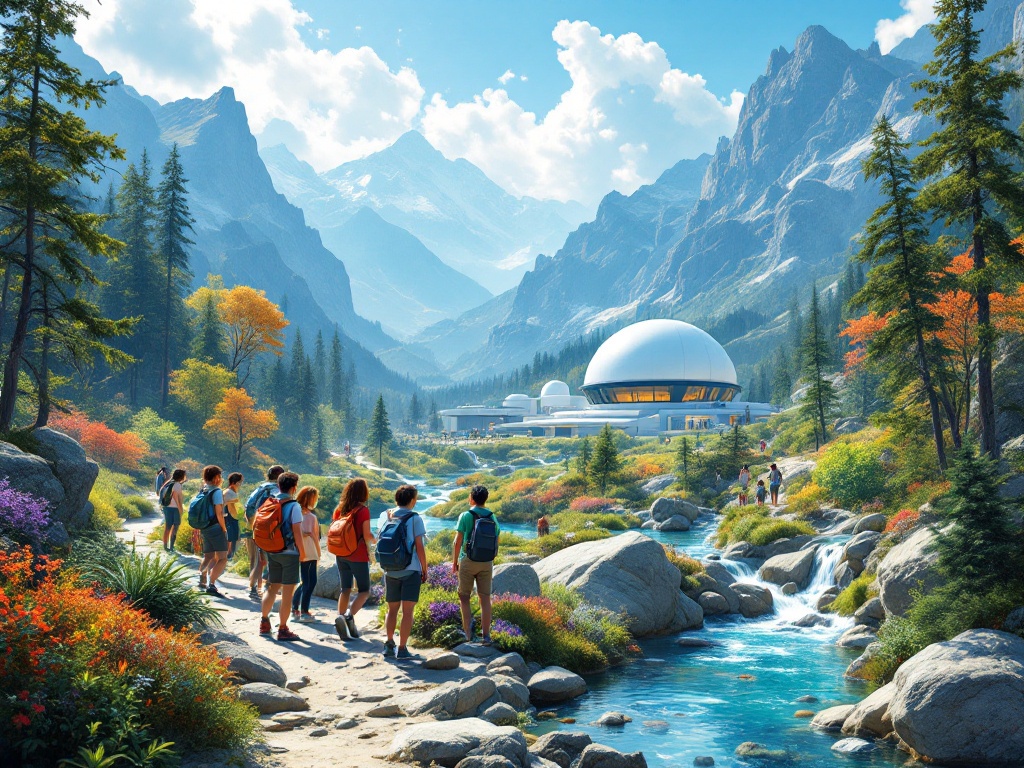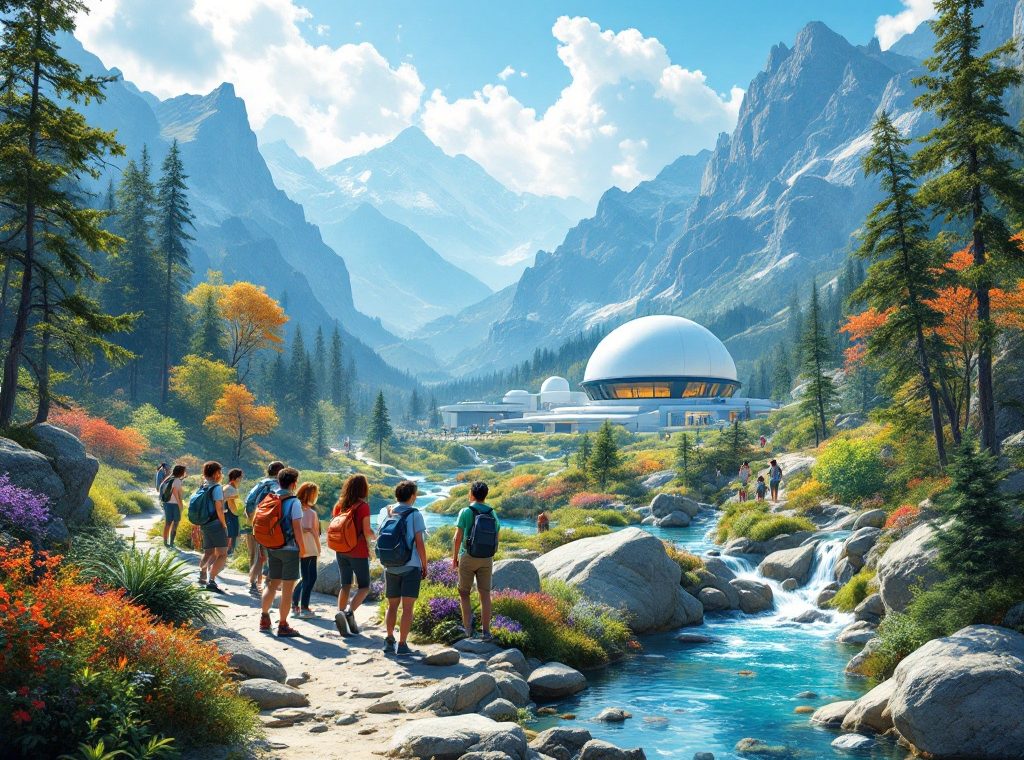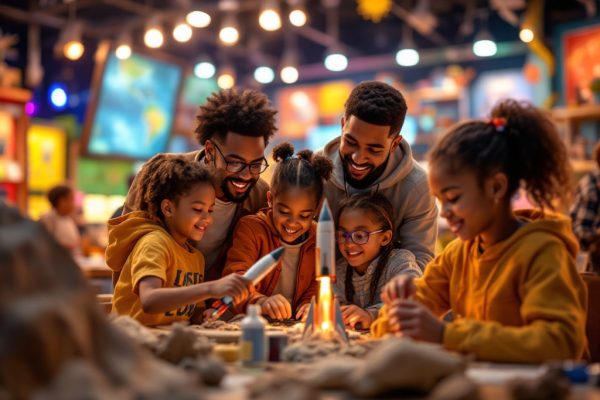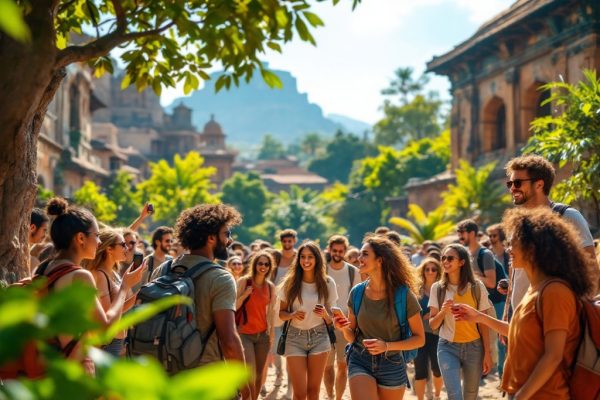Journeys and Science: How to Learn While Traveling
Want to ignite a passion for science? Discover how educational travel transforms science learning by offering immersive experiences that connect theory to reality. From exploring ecosystems and geological formations to visiting cutting-edge research facilities like CERN, travel brings science to life. Explore the benefits of hands-on learning, cultural immersion, and maximizing study productivity while traveling. Start your educational adventure today!
Important information

- Educational travel enhances science learning through immersive experiences, connecting theory to practice. Students witness scientific concepts firsthand, like exploring ecosystems or visiting research centers.
- Travel provides diverse learning environments. Museums, national parks, historical sites, and cultural interactions offer unique learning opportunities and encourage critical thinking.
- Hands-on activities, such as workshops and field studies, deepen scientific understanding. Examples include visiting CERN or Fermilab for particle physics, exploring coral reefs for marine biology, or observing wildlife for insights into natural selection.
- Travel can be a powerful learning tool for families. Engaging children in planning, choosing destinations based on their interests, and encouraging documentation of their experiences reinforces learning and fosters curiosity.
- Combining travel with academics requires planning and time management. A flexible study schedule, utilizing travel time for focused study, and leveraging digital resources like e-books and online learning platforms maximize learning while exploring.
The Role of Educational Travel in Science Learning
Educational travel significantly boosts science learning by offering immersive experiences where students witness scientific concepts firsthand. For example, exploring ecosystems, examining geological formations, and observing diverse cultural practices connects theory to reality. Visiting research centers reinforces learning, while exploring historical sites brings principles to life. Workshops and field studies further deepen understanding. This approach fosters a genuine appreciation for science.
Benefits of Educational Travel for Science Learning
Educational travel provides immersive experiences, allowing students to witness scientific concepts in action. This hands-on approach connects theory to reality, deepening their understanding and fostering a genuine appreciation for science. For example:
- Exploring ecosystems helps students understand the interconnectedness of living organisms.
- Examining geological formations illustrates Earth’s history and processes.
- Observing diverse cultural practices demonstrates the application of scientific principles in different societies.
Further Learning Opportunities
Educational travel offers diverse learning environments such as museums, national parks, and cultural sites. These experiences spark curiosity and encourage critical thinking. Travelers can:
- Visit research centers to see how scientific discoveries are made.
- Explore historical sites to understand the evolution of scientific thought.
- Engage with local experts to gain new perspectives.
- Participate in hands-on activities, like workshops and field studies, to reinforce learning.
Immersive, Hands-On Learning Experiences
Educational travel immerses students in hands-on learning experiences. For example, a trip to CERN in Switzerland or Fermilab in the USA lets students explore particle physics at renowned research facilities. There, they can witness ongoing research, interact with scientists, and gain firsthand exposure to experiments rarely seen in classrooms. These unique opportunities can inspire further STEM exploration.
Exploring Cultural Diversity Through Travel
Immersing yourself in different cultures is incredibly enriching, deepening your appreciation for diverse traditions and perspectives. Interacting with local communities offers valuable insights into their customs, beliefs, and lifestyles. Sampling new cuisines becomes an adventure, enhanced by exploring bustling local markets. History comes alive when you visit historical sites. These immersive experiences foster personal growth, broadening your worldview and nurturing empathy and respect. Respectful engagement, however, is crucial for meaningful cultural exchange. Learning basic phrases in the local language demonstrates respect and eases communication. Moreover, being mindful of local customs showcases cultural sensitivity. Here’s how to make the most of cultural immersion:
Engage with local communities. Seek out opportunities to interact with locals, learning about their customs, beliefs, and lifestyles.
Savor the local cuisine. Explore bustling markets and sample new dishes to embark on a culinary adventure.
Explore historical sites. Visiting historical sites brings history to life, offering a deeper understanding of the local culture.
Learn basic phrases. Demonstrating respect and facilitating communication can be achieved by learning basic phrases in the local language.
Be mindful of customs. Showcasing cultural sensitivity can be done by being mindful of local customs.
Science Exploration Opportunities While Traveling
Embark on a journey to CERN or Fermilab for a glimpse into the world of particle physics. Public tours reveal the inner workings of accelerators and detectors, showcasing cutting-edge research.
Explore coastal regions and coral reefs to delve into marine biology and conservation. Snorkeling, diving, and aquarium visits provide unique perspectives on vibrant marine life and the importance of protecting these vital ecosystems.
The Galapagos Islands, Amazon rainforest, and African savannas teem with wildlife, offering a firsthand look at natural selection. Guided tours illuminate the diverse flora and fauna, making evolution come alive.
From national parks to the Grand Canyon and volcanic regions, geological formations reveal Earth’s history. Guided hikes, ranger programs, and museum exhibits offer insights into our planet’s past and the environmental challenges it faces.
For space enthusiasts, NASA’s Kennedy Space Center and the Smithsonian National Air and Space Museum offer interactive exhibits, historical artifacts, and astronaut encounters, bringing the past and future of space travel into focus.
Understanding Particle Physics at Research Facilities
At CERN, home of the Large Hadron Collider, students can witness cutting-edge particle physics research firsthand. Scientists there grapple with fundamental questions about the universe, exploring the nature of matter and the origins of mass. For a different scientific perspective, consider the following options:
- Griffith Observatory, which offers insights into astronomy and space science.
- Galileo Museum, which showcases remarkable scientific instruments.
Observing Natural Selection and Adaptation in Wildlife
Animals showcase incredible survival techniques in their natural environments. Chameleons use camouflage to blend seamlessly with their surroundings, while Darwin’s finches have evolved specialized beaks perfectly adapted to their specific food sources. Bats, masters of the night, navigate and hunt using echolocation, emitting sound waves to map their surroundings. These remarkable adaptations highlight the power of natural selection, where species evolve over time to thrive in their unique ecological niches. Observing these intricate survival strategies offers invaluable insights into the complex web of life and deepens our understanding of the evolutionary processes that shape our planet.
Learning About Marine Biology and Conservation
Coastal areas, aquariums, and marine research centers offer fantastic opportunities for studying marine ecosystems. Students can observe marine life firsthand, learning about conservation and the impacts of pollution and climate change. A visit to the Monterey Bay Aquarium, for instance, can be incredibly insightful, as can participating in a coral reef restoration project. These hands-on experiences provide invaluable learning opportunities. For example, students can explore diverse habitats like rocky shores, estuaries, and kelp forests, examining the intricate relationships between organisms and their environment. They can also engage in research projects, collecting data on water quality, marine biodiversity, and the effects of human activities. Furthermore, aquariums and research centers often offer educational programs and workshops led by experts, providing students with in-depth knowledge and practical skills in marine science. Through these experiences, students gain a deeper understanding of marine ecosystems and the importance of conservation efforts.
Delving into Geology and Environmental Science
Experience the wonders of geology and environmental science through firsthand exploration of geothermal areas and volcanic landscapes. These destinations offer an educational and awe-inspiring adventure, showcasing the real-world impact of geological processes.
Engaging with Space Exploration History and Interactive Exhibits
Embark on a cosmic journey at interactive space centers like Florida’s Kennedy Space Center and Kazakhstan’s Baikonur Cosmodrome. These sites showcase historic missions and rocket launches, offering a firsthand glimpse into the incredible achievements of space agencies. For a broader scientific perspective, explore renowned science museums such as London’s Science Museum or Munich’s Deutsches Museum, both brimming with fascinating exhibits. Alternatively, delve into the societal impact of scientific achievement at Stockholm’s Nobel Museum. These institutions often enhance the experience with educational opportunities like guided tours, interactive exhibits, and enriching workshops.
Space Centers
- Kennedy Space Center, Florida, showcases historic missions and rocket launches.
- Baikonur Cosmodrome, Kazakhstan, offers a glimpse into space agency achievements.
Science Museums
- Science Museum, London, provides a broad scientific perspective with fascinating exhibits.
- Deutsches Museum, Munich, also offers a wide range of scientific exhibits.
- Nobel Museum, Stockholm, explores the societal impact of scientific achievements.
Many of these institutions enhance the visitor experience with educational opportunities such as guided tours, interactive exhibits, and enriching workshops.
Incorporating Learning into Family Travel
Turn family trips into educational adventures! Involve your kids in the planning process. Choose destinations that cater to their interests, such as dinosaur museums or space centers. Consider interactive museums, historical sites, and national parks for hands-on learning experiences.
Nurture Curiosity
Encourage questions and discussions about what they see and experience. Have them document their journey through photos, journals, or drawings to reinforce their learning.
Educational Travel Time
Even travel time can be educational. Play learning games, listen to audiobooks, or discuss your destination.
Exploring new cultures is invaluable, exposing children to diverse perspectives and customs. This fosters adaptability and understanding. Travel is an enriching educator.
Traveling with Children: Harnessing Learning Opportunities
Travel is a powerful tool for opening young minds, offering unique learning opportunities beyond the classroom. New environments spark curiosity and encourage adaptability, from historical sites that bring history to life to interactive museums that make science tangible. Engaging with different cultures broadens perspectives and builds understanding. Exploring nature provides firsthand lessons about ecosystems. Even simple activities like navigating a new city or trying new foods expand horizons and build valuable skills, creating lasting memories and fostering a lifelong love of learning.
Making Educational Adventures Fun and Engaging
Transform learning into an exciting adventure! Incorporate interactive activities, games, and friendly competitions to make it enjoyable. Consider these immersive learning experiences:
- Interactive museums and science centers provide fantastic hands-on learning opportunities.
- Explore historical sites and experience history firsthand.
- Local cultural workshops and guided tours offer enriching learning experiences.
Tailor trips to your child’s interests. For example, if you have a future astronaut, a visit to the space center will ignite their passion and cultivate a love for learning.
Maximizing Productivity and Learning During Travel
Traveling offers surprising opportunities for productive study. Long journeys on trains or planes provide uninterrupted stretches to concentrate. Enhance your learning on the go with podcasts and audiobooks.A consistent study schedule is crucial, even while traveling. Dedicate specific times to your studies and maintain a regular routine. To prevent burnout, incorporate breaks into your schedule. For instance, study for an hour, then pause to stretch your legs or admire the view. Remember to be flexible and adapt your study plan around your travel itinerary. Here’s how to make the most of your travel study time:
Planning
- Establish a routine. Set aside specific times each day for studying, just as you would at home.
- Sync your study plan with your itinerary. Be realistic about how much you can study each day, factoring in travel time and sightseeing.
Execution
- Utilize travel time. Long flights and train rides are perfect for focused study sessions.
- Embrace audio learning. Podcasts and audiobooks can make learning enjoyable during downtime.
- Schedule breaks. Avoid burnout by taking regular breaks to stretch, walk around, or simply relax.
Utilizing Travel Time for Studying
Travel offers a surprising amount of study time. Long flights and train journeys become dedicated study sessions, perfect for reviewing notes, reading textbooks, or even completing assignments. This focused approach boosts learning and improves academic performance. For a productive study environment, pack noise-canceling headphones and portable study materials. Travel and studying: a powerful combination.
Creating a Study Schedule and Maintaining Consistent Study Times
A structured study plan is your key to staying focused and productive while traveling. It’s tempting to get sidetracked, but a consistent routine will keep you on course. Maintaining regular study habits, even in unfamiliar environments, ensures effective learning. A well-planned schedule helps balance the excitement of exploring new destinations with your academic pursuits, allowing you to enjoy your travels while making progress toward your goals. Here’s how to create a study plan that works for you:
Set Realistic Goals. Start by setting achievable study goals. Don’t try to do too much at once, especially when you’re in a new environment. Break down your study material into smaller, manageable chunks, focusing on specific topics or chapters each day.
Establish a Routine. Consistency is key. Designate specific times for studying, just as you would at home. A regular schedule helps maintain focus and prevents procrastination. Early mornings or late evenings might be ideal, depending on your travel itinerary.
Find Your Ideal Study Spots. Explore your surroundings and identify suitable study locations. Quiet cafes, libraries, or even a peaceful corner in your accommodation can serve as effective study environments. Experiment with different locations to find what works best for you.
Embrace Flexibility. While a routine is important, be prepared to adapt. Travel often involves unexpected delays or changes in plans. Build some flexibility into your schedule to accommodate these unforeseen circumstances without derailing your study progress.
Utilize Travel Time. Turn travel time into productive study sessions. Download relevant study materials, podcasts, or audiobooks to your devices. Review notes, practice language skills, or brainstorm ideas during long journeys. This maximizes your time and reinforces learning.
Using Digital Resources and Study Materials on the Go
E-books are a traveler’s best friend, offering portability and adjustable font sizes for comfortable reading anywhere. Online learning platforms are another invaluable tool, providing structured courses, interactive exercises, and downloadable resources accessible on the go. Travelers can also employ effective study techniques while traveling.
Benefits of using flashcards
Flashcards facilitate quick reviews of learned material, allowing travelers to reinforce their knowledge on the go. They are portable and easy to use, making them ideal for studying during commutes or downtime.
Summarizing key concepts
Summarizing key concepts in a travel journal reinforces learning by encouraging active engagement with the material. This method helps travelers synthesize information and identify areas needing further review.
Active recall, or testing yourself on the material, is another powerful method for solidifying knowledge. While finding quiet study spaces can be difficult while traveling, libraries and cafes offer a respite from the hustle and bustle. Noise-canceling headphones can also create a focused environment, enabling effective studying amidst distractions.
Leveraging E-Books and Online Learning Platforms
E-books offer a portable library, providing access to a vast collection of educational resources on the go. Online learning platforms enhance this experience with structured courses, interactive exercises, and virtual labs. They serve as a digital companion to your travels, enabling continuous learning wherever you are.
Effective Study Techniques for Travelers
Mobile learning tools like Anki and Quizlet make memorization convenient and portable.
Note-taking apps like Evernote and OneNote allow travelers to easily record thoughts and document their experiences.
Audio resources, such as downloadable lessons and podcasts, transform commute time into valuable learning opportunities.
Whether you’re studying a language or exploring a new topic, audio learning is effective.
Combining Academic Work with Travel Experiences
Combining travel and academics creates a powerful learning experience. However, careful planning and efficient time management are essential for success. Travel offers hands-on learning that connects classroom concepts to real-world situations. For example, exploring new cultures can ignite motivation and deepen understanding across various subjects. These experiences spark curiosity and inspire further academic pursuits. Beyond its inherent enjoyment, travel enriches classroom learning, leading to a more engaging and comprehensive educational journey.
Balancing Academic Responsibilities and Exploration
Successfully balancing academics and travel depends on a smart, adaptable study schedule. This schedule should prioritize essential academic tasks and designate specific study times while aligning with your travel plans. For example, researching a historical site’s scientific significance before visiting transforms travel into active learning, boosting both academic progress and personal growth. While travel offers unique learning opportunities, effective time management is crucial. Allocating specific study times, even during exploration, ensures continuous learning and enriches your travel experiences. This powerful combination broadens your horizons while adding depth to your travels.
Enhancing Engagement and Motivation Through New Experiences
New experiences boost engagement by igniting curiosity and offering unique learning opportunities. Exposure to different cultures broadens understanding, encouraging deeper exploration and increasing interest. This cultivates a desire to learn, ultimately enhancing academic performance. For instance, visiting a historical site brings history to life, while observing wildlife reinforces biological concepts. These hands-on experiences create lasting memories and foster a love for learning that extends beyond the classroom. They also promote personal growth by encouraging adaptability and problem-solving skills. Travel, in particular, exposes individuals to diverse perspectives and challenges, fostering resilience and independence. Engaging with new environments also improves social skills through interaction with different people and communities, building confidence and empathy. Furthermore, new experiences can spark creativity and innovation by offering fresh perspectives and inspiring new ideas. Whether it’s learning a new language, trying a new sport, or exploring a new city, stepping outside of one’s comfort zone can lead to unexpected discoveries and a richer, more fulfilling life.












